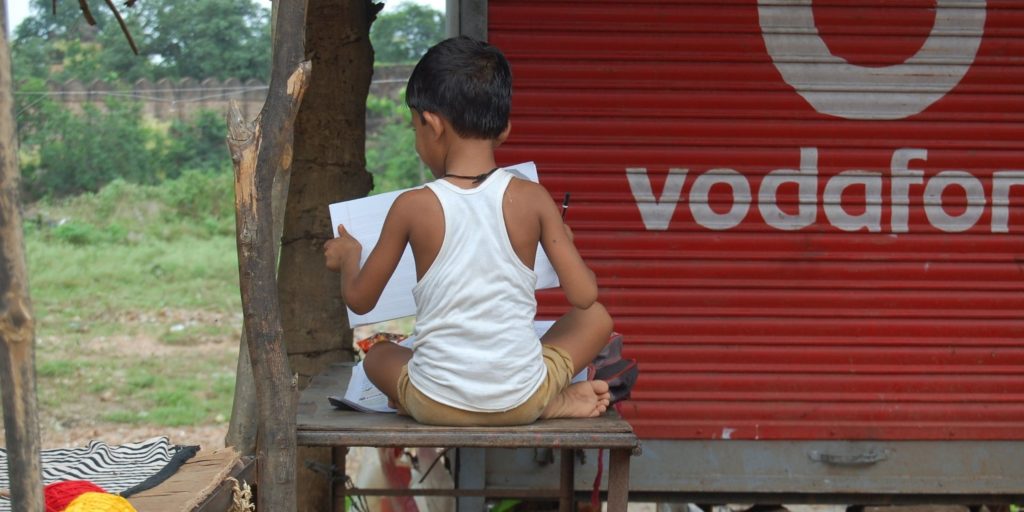The Right of the Child to Education was embedded as one of the core tenets of the 1989 Convention on the Rights of the Child (CRC). It has since then, notably featured among all global imperatives, including the ambitious Sustainable Development Goals (SDGs) for 2030. SDG 4 aims to ensure inclusive and equitable quality education for all. However, COVID-19 and the subsequent lockdowns leading to the closure of schools have hampered the progress considerably. One of the key challenges has been inequitable access to digital facilities. According to the third edition of the State of Education Report released by UNESCO, only 22% of schools in India have the capability of computing devices.
Education Technology (EdTech) solutions have improved learning outcomes; however, they have not benefited the economically underserved. Over 290 million children were out of school in India due to the pandemic, and only one in four had access to digital learning. The lack of affordable solutions and hardware, lack of awareness among parents, and lack of engagement with students and parents are barriers that impede access to EdTech solutions and thus contribute to the growing digital divide. Limited evidence at scale on the effectiveness of EdTech models with low-income communities also restricts access to philanthropic and outcome-based funding.
With the closure of schools, the need to expand digital learning solutions became more prominent. The National Education Policy 2020 also acknowledged it and talked about creating a more robust digital infrastructure. The Government of India launched the e-Vidya programme in 2020 to unify all efforts related to digital education. The aim was to enable equitable access to education. However, despite the efforts, a sizable chunk of the population still could not access digital learning. According to the School Children’s Online and Offline Learning (SCHOOL) survey conducted in August 2021, only 8% of children are studying online regularly in rural areas.
This is where Bharat EdTech Initiative (BEI) comes into the picture. The initiative aims to bridge the digital divide by leveraging at-home learning time to ensure quality education and improve learning outcomes for all children. By 2025, BEI aspires to enable digital access to 1 million underprivileged children in India and demonstrate improved learning outcomes. The initiative plans to do this by ensuring access and strong adoption of proven EdTech solutions at scale. BEI will focus on improving EdTech products’ affordability to make them accessible to economically underserved communities.
Households with children enrolled in grades 1–12 use 41% of their education expenditure on supplementary education due to increasing competitiveness and demand for quality education. With an increase in digitisation, EdTech solutions for home-based learning are also growing. BEI’s objective is to complement classroom teaching with home-based learning, making it a permanent feature of education among the economically underprivileged. The initiative intends to provide a platform to learn anytime and anywhere, beyond or in addition to school-based learning.
The engagement of parents in a child’s education is directly proportional to the academic outcomes. However, often because of the lack of awareness and time, parents are not involved beyond enrolling their child and ensuring attendance. The closure of schools due to the pandemic helped increase parental presence and involvement, with studies recording that parents may have gained more knowledge about their children’s education. To further this, BEI focuses on parent engagement to ensure better adoption of home-based learning solutions.
With the evolution of the EdTech ecosystem during the pandemic coupled with a growing internet reach, BEI believes that this is an excellent time to bridge the learning gap among students from underserved communities. With a focus on improving student learning outcomes, the initiative aims to do so through a holistic approach. The first step would be to aggregate low-income communities and curate proven EdTech solutions. The second step is to ensure active engagement with parents and students and gather data to ensure growth in learning and engagement. The last would be to design positive incentives towards achieving outcomes and demonstrate unit economics to balance viability and scalability. Over the last few months, the initiative has on boarded 75,000 students. At present, BEI consists of four EdTech, three nonprofits, and three assessment partners. Ten donors have also committed funds to the initiative.
Over the next few years, BEI aims to change the way students learn at home by building an ecosystem of enabling capabilities that is not a substitute for school education but goes beyond it. If you want to join the initiative to provide strategic guidance or advocate for a gender lens by joining as a girl child-focused funder, do reach out to us at – [email protected]. If you are a nonprofit working with upwards of 2500 students comfortable with English medium of instruction, belonging to low-income families (=< INR 25k / month) who have access to hardware devices, write to us and join this initiative as an implementation partner.


















